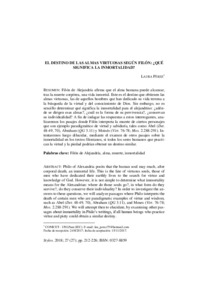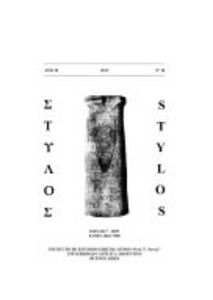Please use this identifier to cite or link to this item:
https://repositorio.uca.edu.ar/handle/123456789/9704| Título: | El destino de las almas virtuosas según Filón : ¿qué significa la inmortalidad? | Autor: | Pérez, Laura | Palabras clave: | ALMA; MUERTE; INMORTALIDAD; Filón de Alejandría, 20 a.C.-50 d.C.; FILOSOFIA | Fecha de publicación: | 2018 | Editorial: | Universidad Católica Argentina. Facultad de Filosofía y Letras. Instituto de estudios grecolatinos "Prof. F. Nóvoa" | Cita: | Pérez, L. El destino de las almas virtuosas según filón : ¿qué significa la inmortalidad? [en línea]. Stylos, 2018, 27. Dispinible en: https://repositorio.uca.edu.ar/handle/123456789/9704 | Resumen: | Resumen: Filón de Alejandría afirma que el alma humana puede alcanzar, tras la muerte corpórea, una vida inmortal. Este es el destino que obtienen las almas virtuosas, las de aquellos hombres que han dedicado su vida terrena a la búsqueda de la virtud y del conocimiento de Dios. Sin embargo, no es sencillo determinar qué significa la inmortalidad para el alejandrino: ¿adón-de se dirigen esas almas?, ¿cuál es la forma de su pervivencia?, ¿conservan su individualidad? A fin de indagar las respuestas a estos interrogantes, ana-lizaremos los pasajes donde Filón interpreta la muerte de ciertos personajes que son ejemplo paradigmático de virtud y sabiduría, tales como Abel (Det. 48-49, 70), Abraham (QG 3.11) y Moisés (Virt. 76-78; Mos. 2.288-291). In-tentaremos luego dilucidar, mediante el examen de otros pasajes sobre la inmortalidad en los textos filonianos, si todos los seres humanos que practi-can la virtud y la piedad podrían obtener un destino similar. Abstract: Philo of Alexandria posits that the human soul may reach, after corporal death, an immortal life. This is the fate of virtuous souls, those of men who have dedicated their earthly lives to the search for virtue and knowledge of God. However, it is not simple to determine what immortality means for the Alexandrian: where do those souls go?, in what form do they survive?, do they conserve their individuality? In order to investigate the an-swers to these questions, we will analyze passages where Philo interprets the death of certain men who are paradigmatic examples of virtue and wisdom, such as Abel (Det. 48-49, 70), Abraham (QG 3.11), and Moses (Virt. 76-78; Mos. 2.288-291). We will attempt then to elucidate, by examining other pas-sages about immortality in Philo’s writings, if all human beings who practice virtue and piety could obtain a similar destiny. |
URI: | https://repositorio.uca.edu.ar/handle/123456789/9704 | ISSN: | 0327-8859 | Disciplina: | LITERATURA | Derechos: | Acceso abierto | Fuente: | Stylos Nº 27, 2018 |
| Appears in Collections: | STY - 2018 nro. 27 |
Files in This Item:
| File | Description | Size | Format | |
|---|---|---|---|---|
| destino-almas-virtuosas-filon.pdf | 223,14 kB | Adobe PDF |  View/Open | |
| stylos27.jpg | 297,44 kB | JPEG |  View/Open |
Page view(s)
105
checked on Apr 30, 2024
Download(s)
1,466
checked on Apr 30, 2024
Google ScholarTM
Check
This item is licensed under a Creative Commons License

